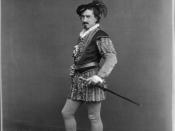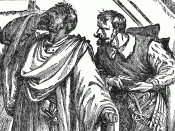William Shakespeare presents an excellent leader but a poor reasoner in "Othello". The eponymous hero has strength, charisma, and eloquence. Yet these ideals of leadership do not bode well in real world situations. The battlefield and Senate are, at least in Othello, depicted as places of honor, where men speak truly. In addition, the matters of war and state are relatively simple; no one lies to Othello, all seem to respect him. He never even has to fight in the play, with the enemy disappearing by themselves. This simplistic view does not help him in matters of the heart. His marriage is based on tall tales and pity and his friendships are never examined; he thinks that anyone who knows him love him. Thus the ultimate evaluation of Othello must be that, although he leads well and means well, he lacks good judgement and common sense.
This becomes most plainly obvious in his final two speeches, where even though the play ends properly, and in a dignified way, Othello never fully realizes or takes responsibility for what has happened.
These two last orations of Othello are noble in speech and purpose, but lack comprehension. He uses the first to attack himself for his horrible deed; certainly this is the first reaction of anyone who has wrongly killed his beloved. He delivers condemnation upon himself with eloquence and anguish. The latter speech he gives in his final role as a leader, directing the men who remain about how to deal with what has happened and showing them he has purged the evil.
In his initial self-loathing and remorse at realizing the truth of Desdemona's innocence, Othello is genuinely anguished. "This look of thine will hurl my soul from heaven, / And fiends will snatch at it." (V.2.325-326)...
![From the Library of Congress: TITLE: Thos. W. Keene. Othello CALL NUMBER: POS - TH - 1884 .O7, no. 1 (C size) [P&P] REPRODUCTION NUMBER: LC-USZC6-58 (color film copy transparency) RIGHTS INFORMATION: No known restrictions on publication. MEDIUM: 1 print (](https://s.writework.com/uploads/9/94760/library-congress-title-thos-w-keene-othello-call-number-pos-thumb.jpg)

